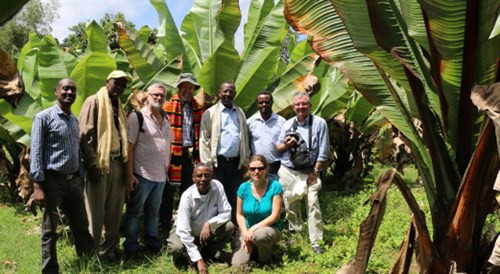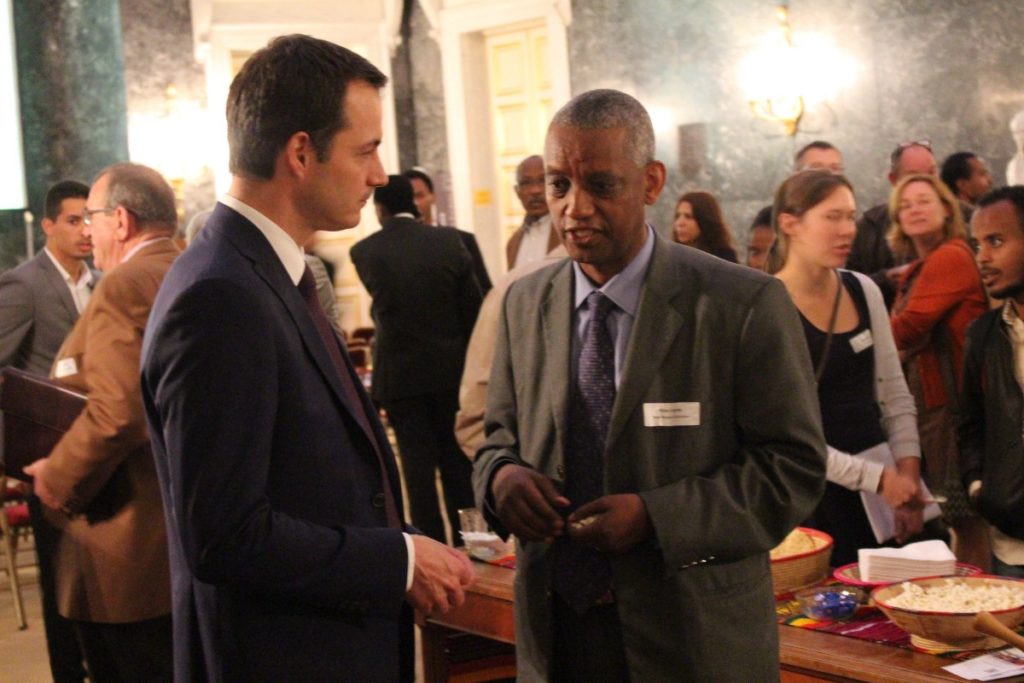How to accelerate development through successful partnerships in higher education
This article was originally published in the second issue (April 2016) of the The Ethiopian Messenger, the quarterly magazine of the Embassy of Ethiopia in Brussels.
Ethiopia and Belgium have enjoyed a long-standing diplomatic relation dating back to 1906. Belgium mostly imports coffee, cut flowers, grains and horticultural products from Ethiopia, while Ethiopia imports agricultural chemicals and machinery. Despite the more than century old diplomatic relations, the Belgian investment in Ethiopia falls short when compared with flow of investment from countries like the Netherlands, China or the Great Britain. Recently however, Belgian investors have shown a greater interest to invest in Ethiopia, among others because of the economic growth of Ethiopia, which is one of the fastest in the world.

The bilateral development relation of the two countries tells a different and lively story. Ethiopia was on the Belgian list of bilateral partner countries until 2003 when Belgium reformulated its cooperation policy after the Paris Declaration on Aid Effectiveness. Belgium’s primary focus in Ethiopia shifted to higher education and to a lesser extent to food security and agriculture. Though this has resulted in the reduction of the total amount of the financial support, the policy change accelerated a successful academic collaboration and networking between Ethiopian and Belgian Universities and has since become one of the most valuable, effective, sustainable and visible development cooperation instrument of the two countries’ age-old relation.
Belgium implemented the Interuniversity cooperation (IUC) in an institutionalized framework and is pursuing its North‐South programs through its Flemish and French speaking Universities. The substantial amount of the institutionalized academic collaboration between Ethiopia and Belgium is expedited through the Flemish Interuniversity umbrella organization for development cooperation, VLIR-UOS, a public institution founded by the Flemish Interuniversity Council (VLIR).
The VLIR-UOS cooperation framework includes the provision of a generous scholarship scheme and implementation of inter-university projects that are formulated to develop the teaching, research, institutional management and community service of partner country universities. The projects supports the development of a high‐level scientific knowledge and skills through the collaboration between Belgian and Ethiopian universities. This unique arrangement has enabled Universities like U Ghent and KU Leuven to share and transfer their expertise, experience and know-how in fields like agricultural technology, public health, water and sanitation sciences, natural resource conservation with the two Ethiopian Universities, Jimma and Mekelle, selected under the first cooperation framework in 2003.
Other universities such as Addis Abeba school of Veterinary Medicine, Bahir Dar, Arba Minch, Ambo, Gondar, Diredawa and Addis Ababa Science and Technology have partnered with the Belgian universities and colleges on a single project basis. The other Belgian universities involved are Hasselt, VUB and institutes such as Institute of Tropical Medicine and the Antwerp Institute of Development Policy and Management. In addition, KU Leuven Campus Group T has a special agreement with the Ministry of Education of Ethiopia to train a selected number of Ethiopian university lecturers in various engineering fields under its own distinct budget.
VLIR-UOS made a significant amount of investment in Ethiopia over the last decade through several capacity building programs. To date, it has channelled 16 million Euros for about 50 academic cooperation projects, and more than 12.5 million in scholarships for the training of 900 masters and PhD students, which amounts to 29 million Euros in academic cooperation with Ethiopia since 2003. This makes Ethiopia the first beneficiary country of the VLIR-UOS program and apart from the Democratic Republic of Congo, Ethiopia is the only country to host a VLIR-UOS country office. Furthermore, both Ethiopian and Belgian universities assign coordinators facilitating the collaboration from both ends.

Furthermore, the partnership resulted in many high-level researches that directly benefited the Ethiopian society in general and Ethiopia’s development endeavors in particular. These include research to eliminate the negative impact of the Gilgel Gibe dam on malaria that was spread because of mosquitos breeding as a consequence of the dam, identifying ways to helps cattle breeders protect their cattle from the sleeping sickness disease, and increasing soil and water conservation in the northern and southern part of Ethiopia and Lake Tana basin.
The cooperation between Belgian academic institutes and its southern partners in Ethiopia has proven to be effective and exemplar for a successful North-South partnership. The programme is unique in so far it is based on a partnership, convergence in the field of interest and expertise between Belgian and Ethiopian universities. The VLIR‐UOS programme was conceived at a time when the main modality of international aid was channelled through stand‐alone projects, which still accounts for the delivery of the majority of worldwide development projects. Through this unique arrangement, a substantial amount of VLIR‐UOS funding is used directly by partner institutions in Ethiopia. Moreover, it focus on capacity building programs at the highest academic levels; MSc and sandwich PhD programs amongst others. These sandwich PhDs programs are designed to be undertaken both in Belgium and in Ethiopia. This approach will have a long term positive impact on Ethiopia’s development endeavour by allowing the country to retain its highly trained personnel while providing research and internship opportunities for Belgian universities as well as enriching the diversity and competiveness of Belgian universities via the highly valued Ethiopian students.
Despite the 2008 financial crisis and a policy change aligned towards its bilateral partner countries, Belgium has shown its consistent and continuous commitment to support a sustainable development in Ethiopia. In a conference entitled ‘Making a Difference in Ethiopia. The Impact of University Cooperation for Development’ held on 5th November 2014 and organized by VLIR-UOS, the Deputy Prime Minister of Belgium and Minister of Development Cooperation, H.E. Mr De Croo reaffirmed the support of his government to the academic cooperation since it has proven its effectiveness. Overall, Ethio-Belgian collaboration in higher education is a good example of how inter-university cooperation for development makes a real and tangible difference. There is a consensus between academics and policy-makers that this should remain a key component of the Belgian development policy. Likewise, Ethiopian stakeholders regard the partnership as an effective investment with high value for money and the government of Ethiopia attaches great value to this partnership. Henceforth, it is clear that the partnership between Ethiopian and Belgian universities will continue to flourish for some time to come.

On 2nd July 2015, VLIR-UOS launched a call for its inter-university Cooperation and network components for universities amongst its twenty partner countries. Six institutions including the Ethiopian Arba Mich and Bahir Dar universities were selected. A third, Jimma University was included for networking in the second round of VLIR-UOS program. Under this arrangement, the networking component allows Jimma university to consolidate the achievements gained during the first round of the collaboration and maximize the impact and sustainability of the cooperation by keeping it in the network of its Belgian partner universities.
The Ethiopian government would like to further strengthen and deepen the cooperation to enhance the results achieved so far and raise the level of collaboration to a long-term partnership backed by a Memorandum of Understanding in a way that can ensure the realization of mutual benefits. This envisions including other Ethiopian Universities into the partnership through a cluster approach and by expanding home grown PhD programs to standardize the delivery quality of higher education across the country.




